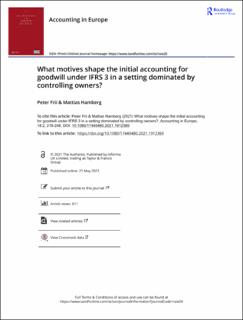| dc.contributor.author | Frii, Peter | |
| dc.contributor.author | Hamberg, Mattias | |
| dc.date.accessioned | 2021-10-19T08:53:54Z | |
| dc.date.available | 2021-10-19T08:53:54Z | |
| dc.date.created | 2021-09-23T17:54:49Z | |
| dc.date.issued | 2021-06 | |
| dc.identifier.citation | Frii, P., Hamberg, M. (2021) What motives shape the initial accounting for goodwill under IFRS 3 in a setting dominated by controlling owners? Accounting in Europe, 18 (2), 218-248. | en_US |
| dc.identifier.issn | 1744-9480 | |
| dc.identifier.uri | https://hdl.handle.net/11250/2823813 | |
| dc.description.abstract | We investigate how different motives shape the initial accounting for goodwill in a setting dominated by controlling owners, using data from 1112 acquisition analyses reported by Swedish listed acquiring firms. In contrast to prior studies, we find no evidence that earnings-based compensation affects the proportion of the purchased price accounted for as goodwill. Instead, we find that when a family-owned firm is the acquirer, a larger proportion of the purchase price is accounted for as goodwill than as specific assets and liabilities. These two findings indicate that controlling owners may curb managerial motives, while controlling family owners apply the discretion of IFRS 3 according to their motives. We also find in this setting that acquisition-related motives have a significant impact on the proportion of the purchased price accounted for as goodwill. Overall, our analyses indicate that the motives shaping goodwill accounting choices depend on the institutional setting. | en_US |
| dc.language.iso | eng | en_US |
| dc.publisher | Informa UK Ltd. (Taylor & Francis) | en_US |
| dc.rights | Attribution-NonCommercial-NoDerivatives 4.0 Internasjonal | * |
| dc.rights.uri | http://creativecommons.org/licenses/by-nc-nd/4.0/deed.no | * |
| dc.subject | regnskap og revisjon | en_US |
| dc.title | What motives shape the initial accounting for goodwill under IFRS 3 in a setting dominated by controlling owners? | en_US |
| dc.type | Peer reviewed | en_US |
| dc.type | Journal article | en_US |
| dc.description.version | publishedVersion | en_US |
| dc.rights.holder | © The Author(s) 2021 | en_US |
| dc.subject.nsi | VDP::Samfunnsvitenskap: 200::Økonomi: 210::Bedriftsøkonomi: 213 | en_US |
| dc.source.pagenumber | 218-248 | en_US |
| dc.source.volume | 18 | en_US |
| dc.source.journal | Accounting in Europe | en_US |
| dc.source.issue | 2 | en_US |
| dc.identifier.doi | 10.1080/17449480.2021.1912369 | |
| dc.identifier.cristin | 1937893 | |
| cristin.ispublished | true | |
| cristin.fulltext | original | |
| cristin.qualitycode | 1 | |

